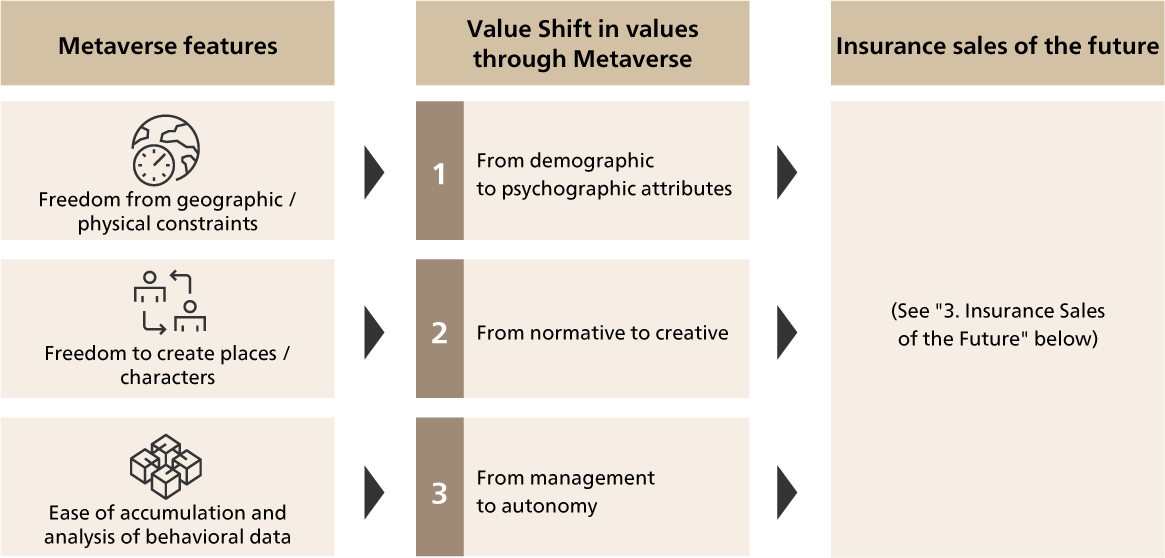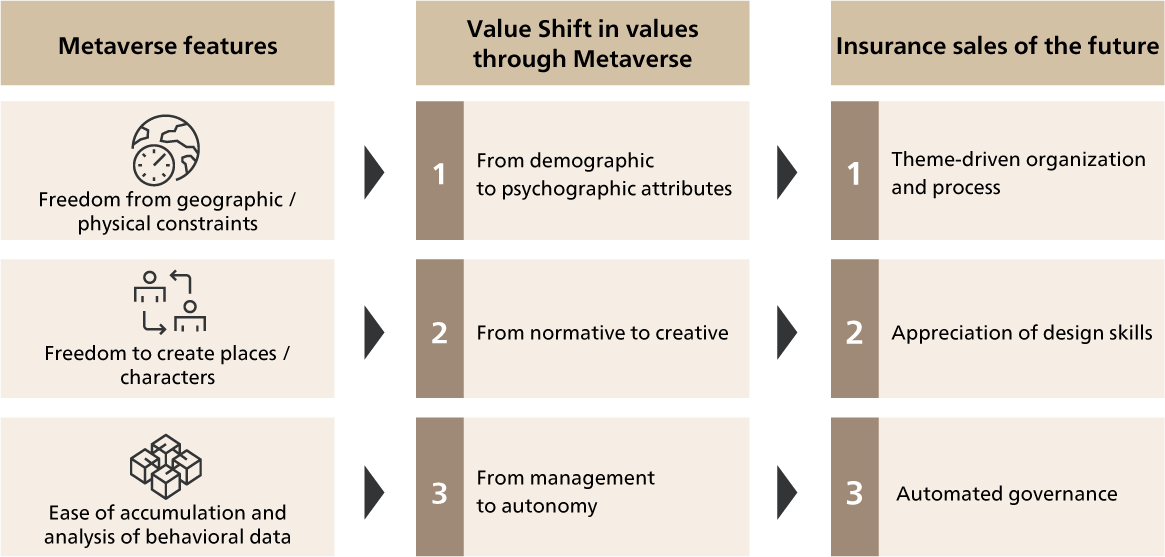The term "Metaverse" is making a buzz, and various organizations and individuals are trying to define it.
In this Insight, we define the Metaverse as "a world in which people operate in an online virtual space," and discuss the future of insurance sales and the possibilities for the time when the Metaverse becomes commonplace.
Metaverse and Sales Activities - Life Insurance
- Insurance
- Technology Transformation

1. Sales manager leading avatars
Here is a hypothetical dialogue between a manager and ten sales staff in the "Metaverse" sales department of an insurance company in the future projection. Wearing headsets, they discuss via their avatars as follows.
Staff : I attended an e-sports soccer event in my sales area yesterday. That was quite awesome. Virtual goods sales exploded, probably making some million dollars. So there, I got acquainted with a famous soccer player at the post-game event. Then, I promised the player to visit the virtual practice field next week and propose protection against the publicity rights and the loss or theft of the autographed soccer ball.
Manager : That sounds like a great opportunity. What is his/her gender and age?
Staff : You mean the real ones. I'm afraid I don't know them because the player is an avatar.
Manager : Yeah. Can you find the actual personal information? Of course, don't be too direct. Better build a trusting relationship beforehand. Generally speaking, e-sports players need to keep good physical strength and tend to abuse their eyes. So we can also make a kind of healthcare cover proposal to the player.
Staff : That sounds great. Also, I believe we can support both the lives in real and virtual worlds in a comprehensive and personalized manner. Furthermore, do you think a pear-to-pear (P2P) insurance among players sounds appealing this time?
Manager : Maybe. Anyway, please talk with the player further to find opportunities.
Staff : Ok. I will do that. Well, you know? The player places a "virtual bird" on the shoulder, which is his/her trademark. When I see the player next week, I want to put my virtual bird on my avatar to familiarize myself with the player. May I call a designer to make it?
Manager : Of course. Go ahead.
2. Value shift through the Metaverse
Such a future as described above may come ten or twenty years from now or may not. However, from such imaginary future predictions, we can see the possibility that the Metaverse may change people's values (Figure 1). We discuss the details of the following three points of changes.
- From demographic to psychographic attributes
- From normative to creative
- From management to autonomy
1. From demographic to psychographic attributes
As people communicate via avatars in the Metaverse, an online space, they may form communities with people who share their interests and preferences, free from such constraints as a residential area, gender or age. In other words, in the Metaverse, people may be more concerned about their interests and preferences and what type of theme the community is based on, rather than their gender, age, or community location.
In the future forecast mentioned above, the Metaverse sales team is approaching communities formed by the theme of e-sports events. When the sales manager asks, "What is the gender and age of the player?", the sales staff responds, saying, "I don't know because the player is an avatar." However, they also attempt to make contact in the real world. This situation indicates that communication may be initiated based on psychographic attributes in the virtual world rather than demographic attributes in the real one.
2. From normative to creative
In the Metaverse, people can create places and characters more freely via avatars. This is because the Metaverse provides far less constrained spaces while rooms for design are constrained by physical conditions and social norms in the real world. Under such situation, people may find more values in the ability to create something, rather than adapting to given conditions.
In the future projection, the staff of the Metaverse sales department also tries to add a "virtual" accessory for relationship building when meeting a famous e-sports player via avatar. This indicates that it may be easier to design places and characters more freely according to the purpose of communication in the Metaverse.
3. From management to autonomy
Behavioral data may be easier to accumulate and analyze in the online space than in the offline one. Consumer behavior data, such as website access history, has been gathered and analyzed and the breadth and depth of behavior data may be expanded. There may be two possible directions in this scenario. One direction is for managers to analyze the accumulated data and strengthen management. The other direction is for each individual to act autonomously based on the understanding that their actions are logged as data open to third parties.
It is unclear which direction will be realized. However, considering DAO (Decentralized Autonomous Organization), which is the philosophy of Metaverse and Web 3.0, we would like to expect the direction for individual autonomy.
The future projection of the Metaverse sales department indicates that, while it has a management structure in which the head of the sales department manages ten sales staff, sales staff make proposals spontaneously and the sales manager focuses on advising for the next steps rather than asking them to report on past actions.
 Figure 1: Metaverse Features Characteristics and Metaverse-Driven Induced Value Shifts
Figure 1: Metaverse Features Characteristics and Metaverse-Driven Induced Value Shifts
3. Insurance sales of the future
The Metaverse may drastically change the insurance sales process based on the imaginary scenario. More attentions are given to the Metaverse actually, and some insurance companies have begun to work with companies from other industries to conduct PoC (Proof-of-Concept)related to the Metaverse. However, at this point, many consumers are not yet exposed to the Metaverse daily. Furthermore, even if the Metaverse were to penetrate people's daily lives, it would be necessary to sort out issues such as product approval and regulations related to sales agent qualifications to conduct insurance sales there.
On the other hand, we believe that envisioning the transformation of people's values through the Metaverse will help prepare for the future insurance sales (Figure 2). We elaborate the following three points.
- Theme-driven organization and process
- Evaluation of design capabilities
- Automated governance
1. Theme-driven organization and process
The importance of the approach to communities formed based on some kind of themes is already recognized, and communities based on psychographic attributes in the Metaverse may make the trend even more pronounced.
Area-based approach itself may mean theme-based one in the world where area is segmented based on interests and preferences.
As a result, sales departments may be organized according to the themes and characteristics of the community while usually organized by region now. For sales activities, it may be mainstream to have initial customer contacts in virtual spaces where themes are easy to capture and then move to interaction in the real space.
2. Appreciation of design skills
In addition to product knowledge and the ability to make proposals, the one to create atmosphere and its character are crucial to sales staff currently, but design skill may become more crucial as a part of sales skills when more rooms become available to design places and characters in the Metaverse When a way of self-expression not available in the real world (e.g., avatar with well-crafted design) become available in future, more sales may be generated by adapting to and utilizing the way as a communication tool.
With the digitization of sales activities, there are ongoing activities observed to increase the digital literacy of sales staff. In addition to adapting to such devices as tablets and smartphones and to applications, the ability to design one's sales components in the digital space may become even more crucial as a part of sales skills.
3. Automated governance
The actions done by sales staff may automatically become visible by logging them as data in the Metaverse. It may strengthen management by utilizing logged data as mentioned. However, the role of sales management may be changed based on the assumption that each individual in the organization acts autonomously, taking it for granted that actions are visualized as data open to everyone Rather than tracking past actions and results, sales management may be expected to provide right advice on subsequent actions. Ultimately, an autonomous organization without managers may come to reality.
 Figure 2: Value Shift and the Future Insurance Sales through Metaverse
Figure 2: Value Shift and the Future Insurance Sales through Metaverse
More attentions and expectations are observed around the Metaverse currently, but values and transformation to be created there needs to be discussed further.
We, ABeam Consulting has launched our internal team for the Metaverse and initiated discussion with our clients and the Metaverse related consortiums to capture and leverage the trends properly and lead to meaningful social changes. We will deepen discussion further to co-create valuable businesses with various companies and groups.
Click here for inquiries and consultations


